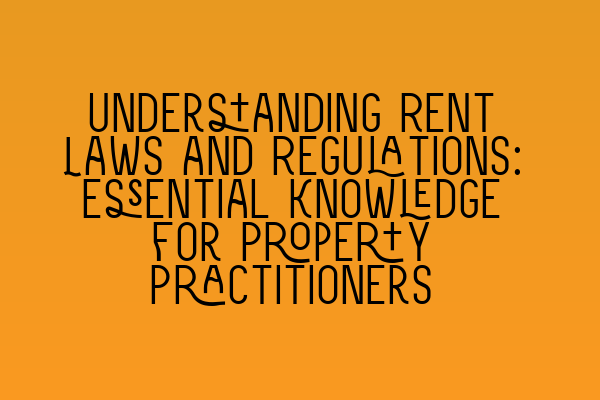Understanding Rent Laws and Regulations: Essential Knowledge for Property Practitioners
Rent laws and regulations play a crucial role in the world of property management and leasing. As a property practitioner, having a firm grasp of these laws is essential to providing sound legal advice and ensuring compliance with the relevant legislation. In this blog post, we will explore key aspects of rent laws and regulations that property practitioners should understand.
1. Purpose of Rent Laws and Regulations
Rent laws and regulations are designed to provide a legal framework for the landlord-tenant relationship and to protect the rights and interests of both parties. These laws govern various aspects of rental agreements, including rent control, security deposits, eviction procedures, and tenant rights. By understanding these laws, property practitioners can guide their clients through the complexities of renting and leasing property.
2. Types of Rent Control
Rent control is a mechanism used by governments to regulate the amount of rent that landlords can charge. There are two main types of rent control: vacancy control and rent stabilization. Vacancy control limits the rent increase for both existing and new tenants, while rent stabilization allows landlords to increase rent within specific guidelines. Familiarizing yourself with the specific rent control laws in your jurisdiction is crucial to ensuring compliance.
3. Security Deposits
Security deposits are a common element of rental agreements. These deposits are intended to protect landlords against property damage or unpaid rent by tenants. However, the laws surrounding security deposits can be complex and vary from jurisdiction to jurisdiction. It is critical for property practitioners to understand the maximum allowable amount for security deposits, the timeline for their return, and any other legal requirements pertaining to their handling.
4. Eviction Procedures
Eviction is a legal process that allows a landlord to remove a tenant from their property. However, eviction procedures are highly regulated, and landlords must follow specific legal steps to avoid violating tenant rights. Property practitioners must have a thorough knowledge of eviction laws and procedures to ensure that their clients act within the bounds of the law.
5. Tenant Rights
Tenant rights are an important aspect of rent laws and regulations. These rights protect tenants from unfair treatment and ensure their safety and well-being. For example, tenants have the right to habitable living conditions, privacy, and freedom from discrimination. Understanding tenant rights is essential for property practitioners to advise their clients on their legal obligations and help resolve any disputes that may arise.
To stay up-to-date with the latest developments in rent laws and regulations, property practitioners should regularly attend continuing education courses and workshops. These programs offer valuable insights into changes in legislation, landmark cases, and emerging trends in rental law.
In conclusion, a solid understanding of rent laws and regulations is indispensable for property practitioners. By familiarizing themselves with the purpose of rent laws, types of rent control, security deposit regulations, eviction procedures, and tenant rights, property practitioners can provide effective legal advice to their clients and ensure compliance with the law. Ongoing professional development and staying informed about the latest developments in rent laws will enable property practitioners to enhance their expertise and deliver exceptional service to their clients.
For more resources and information related to the SQE and property law exams, check out the following articles:
– SQE 1 Practice Exam Questions
– SQE 1 Practice Mocks FLK1 FLK2
– SQE 2 Preparation Courses
– SQE 1 Preparation Courses
– SRA SQE Exam Dates
Remember, staying informed and continuously expanding your knowledge is key to success in the ever-evolving field of property law.
